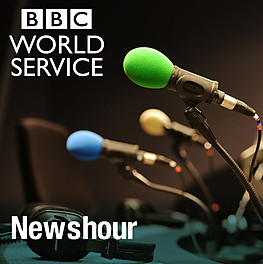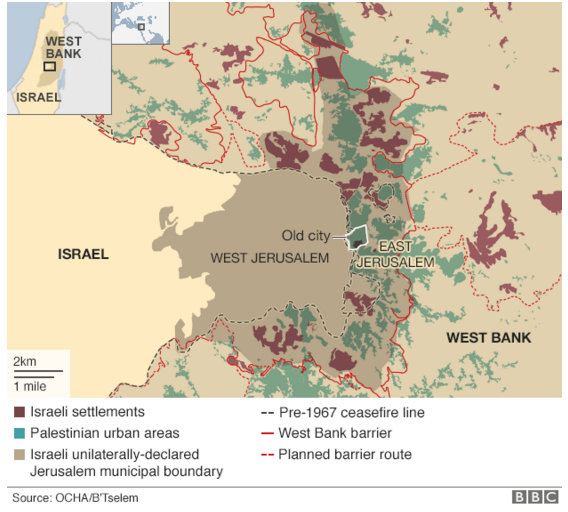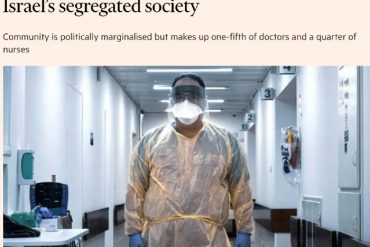As we saw in part one of this post, the February 19th edition of the BBC World Service radio programme ‘Newshour‘ included an interview (from 30:06 here) with UNRWA’s commissioner-general Pierre Krahenbul.
Having failed to challenge Krahenbuhl’s unevidenced claim that an UNRWA education is “an investment in regional security”, presenter Tim Franks next provided him with the cue for dismissal of one of the prime criticisms of the UN agency.
Franks: “What do you say to the other criticism that is often levelled at UNRWA – particularly of your work inside Gaza where there’s a huge proportion of the refugees – and that is that – maybe inevitably, maybe willingly, you have allowed yourself to become too close to the authority that runs Gaza which is Hamas which is proscribed by an awful lot of countries – most of the West sees it as a terrorist organisation – and that the split between what UNRWA does and what Hamas does has become blurred?”
Krahenbuhl: “Working in conflict zones means that you operate in proximity to groups that are either governmental armed forces, that are non-state armed groups so that’s by definition the work. One of the things that you do also is to ensure the neutrality of your work by every means possible. And so just to take the example of Gaza, last year during repair works to two of our schools we discovered tunnels that had been built below those schools. Now we publicly condemned Hamas for those actions and that is a measure of the robustness with which we pursue our policies of neutrality. Now if anybody however can describe to me who would be the alternative provider of education to 270 thousand students in the Gaza Strip who go to UNRWA schools and who among other things are taught a human rights curriculum with focus on tolerance and co-existence, then I’m happy to be told what that alternative is, because there is none.”
As readers may recall, the BBC failed to report the story of those tunnels beneath UNRWA schools at the time. BBC audiences are also unaware of the case last year in which an UNRWA employee was elected to the Hamas political bureau in the Gaza Strip because the BBC chose to ignore that story too. Listeners would therefore not be able to put Krahenbuhl’s flimsy claim that the statement his organisation issued on the topic of those tunnels is evidence of a ‘robust’ approach to ‘neutrality’ into its correct context and Franks made no effort whatsoever to question him further on the long-standing issue of UNRWA employees with links to terror organisations or support for terrorism and promotion of antisemitism on social media by UNRWA staff.
Franks closed the interview by encouraging Krahenbuhl to give “a message for those listening in Washington”.
Franks: “You say that you’re turning to other donors to try and make up what might be a pretty big shortfall in funding as a result of this change in US policy. If you had a message for those listening in Washington about what this dramatic cut in funding would mean, what would it be?”
Krahenbuhl: “The idea that people have to have in mind is to think about what would it be for one’s own family if we faced a situation of conflict where we’re worried about our future and suddenly the key provider of education, services, is no longer able to deliver that and, you know, yet another avenue or horizon is shut. People have to think about in these terms. When you are in the Middle East today, one of the worst things for the Palestinians – but that affects everybody in the region – is that there is no political horizon, there is no personal horizon. There is no freedom of movement, no jobs to be found. We have some of the most, you know, extraordinarily courageous students probably on the planet. I handed over a certificate to a 15 year-old student in Gaza two years ago who had survived an air strike on her home, had spent seven months in a coma. When she woke up she was told by the doctor that her mother and one of her brothers was killed in the strike and yet she was one of the highest performing students in our school. And she has an outlook on life. She wants to be recognised for her skills, for her abilities. She doesn’t want to be seen by the world as only a refugee or a victim. And I think what we need in this region is to rediscover the humanity in people. You know I can…if I believed that polarisation would lead to a solution or to an improvement, I would embrace polarisation but I don’t see that. I see humanity being rediscovered in everybody as being the way forward.”
Franks: “Pierre Krahenbuhl: the boss of UNRWA, the UN agency which supports millions of Palestinian refugees.”
Obviously this interview was not intended to provide BBC audiences with information which would enhance their understanding of the criticism of UNRWA’s mission and performance. Rather, the BBC chose – not for the first time – to provide the UN agency’s head with a friendly platform from which to promote his PR campaign in a near monologue that went unchallenged in any serious manner.
Related Articles:




